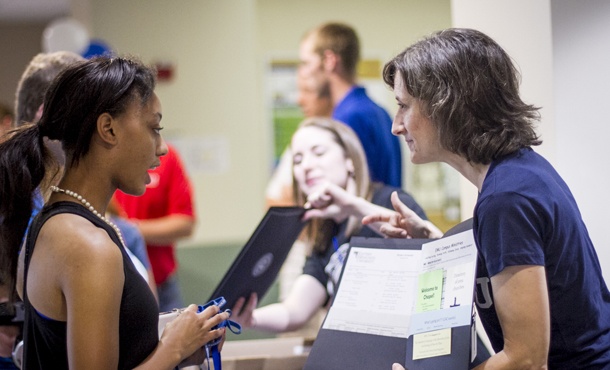In their kick-off convocation remarks for the 2014-15 school year, two of Eastern Mennonite University’s leaders highlighted the increasing diversity among EMU’s student population.
“The class of 2018 is the most racially, ethnically, and nationally diverse incoming class in the history of EMU,” provost Fred Kniss told a capacity crowd of 900 in Lehman Auditorium on Aug. 27. Thirty-six percent of the incoming class is not white. Kniss challenged each listener to identify a difference with another person before the end of the day and to make a point of viewing it as “an invitation to engage,” rather than something to be feared.
“As an institution of higher learning, we know that the best way to develop ourselves and our students intellectually is to engage the new and the strange…,” he said. “You [students] will engage with people who are different from you in significant ways in your residence halls, in your athletic and intramural competitions, in your extracurricular activities, and in your religious lives.”
For students, faculty and staff, Kniss said diversity “enriches our shared life as a community of learning.” He lamented the examples in the United States and elsewhere in the world where “people have been destroying each other rather than embracing diversity and welcoming the stranger.” He pointed to Gaza, Syria, Iraq, Ukraine, and Ferguson, Missouri, as examples of this.
Underscoring the Christian foundation of EMU Kniss said, “We navigate our way through the complexities and ambiguities of modern life by following the way of Jesus in welcoming strangers, embracing people who are different and perhaps marginalized, and engaging new ideas that may be threatening to our old ways of seeing the world. “
President Loren Swartzendruber picked up on this theme with a talk that was both amusing and parable-like, describing the way his farm-rooted family was loyal to the Sperry-New Holland line of farm machinery while they sniffed at those loyal to John Deere equipment – that is, until he married a woman from a “John Deere family.”
Both Kniss and Swartzendruber were carrying forward ideas that Luke Hartman, EMU’s vice president for enrollment, has promoted in speeches and in writing since he became a member of the president’s cabinet in 2011.
In a 2012 talk to the Mennonite Higher Education Faculty Conference (published in three parts in May 2014 on the Mennonite Church USA website and on EMU’s website), Hartman said:
Studies on cognitive development show that critical thinking, problem-solving capacities and cognitive complexity increase for all students exposed to diversity on campus and in the classroom. Diversity leads to the possibility of an enriched and engaging environment where greater learning and skill development is possible. It broadens perspectives, it provides increased exposure to alternative viewpoints, and brings more complex discussions and analysis.
Both Hartman and Kniss stressed that college should be the opposite of a cocoon of familiarity, because, in Hartman’s words, this “impedes the personal struggle and conscious thought that are so important for identity development.”
This year’s convocation expanded on a theme introduced in the 2013 fall convocation, when university leaders stressed the importance of embracing each other within the EMU community, appreciating the gifts and diversity that each student, staffer and faculty member brings to this community of mutual learners. The talks given at this year’s convocation can be heard via podcast here.
